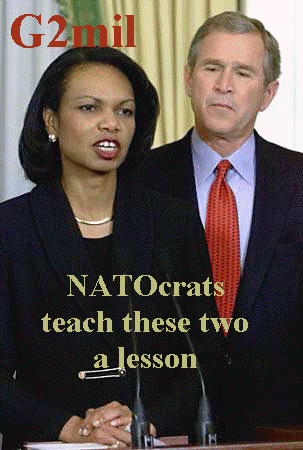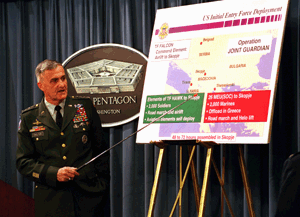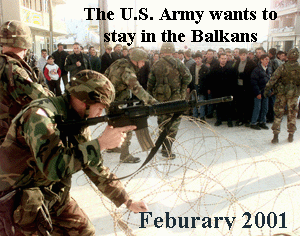


Editorial
After the Soviet Union disintegrated in 1990, many people assumed that NATO would dissolve. Unfortunately, NATO had evolved over 40 years into a powerful bureaucracy which employed thousands and provided billions of dollars to businesses with political connections. U.S. Army and Air Force officers feared loss of their posh senior officer villas and the end of three-year "tours" in Europe. Many NATO nations had enjoyed tens of billions of dollars in annual economic aid for hosting foreign bases, and that money was disappearing as forces were withdrawn. Since NATO was no longer needed to defend Western Europe, NATOcrats knew they must find a new mission to justify their cushy jobs and profitable rackets.
The breakup of Yugoslavia provided the opportunity to reinvent NATO as a peace enforcer. NATOcrats convinced Western leaders that UN troops from NATO countries needed NATO "leadership" to operate effectively. Since this expansion of operations would prove costly, it was important to include American troops so the cash heavy U.S. military would pick up most of the costs. This was easy since the U.S. Army was eager to justify a large peacetime Army and its bases in Germany.
As a result, President Clinton ignored strong opposition in the United States and deployed U.S. troops to Bosnia "just for a year". This one year deployment has gone on for five years and expanded into nearby nations. A look at long-term U.S. Army deployment plans and permanent construction at bases in the Balkans makes it clear that the U.S. Army plans to keep 70,000 troops in Europe for another 50 years. Visit the Task Force Eagle website in Bosnia, click the "Panoramas", and you'll see the permanent buildings and paved roads with curbs, a Baskin Robbins, Burger King, fitness center, and movie theater. Army camps also include base newspapers, MWR tours, and an Equal Opportunity Office.
The U.S. Army now maintains 6000 troops in the Kosovo region of Yugoslavia, 4500 in Bosnia, and even 500 in Macedonia, 130 in Croatia, and 200 in Hungary. Since these troops are supported by larger Army bases in Germany, these Cold War bases now have a mission. Talk of removing some of the remaining 300,000 Americans (including civilians and dependents) from Europe has died, and the $60 billion a year spent to keep them there remains a dependable source of income for millions of Europeans.
NATOcrats became uncomfortable during U.S. elections when George W. Bush argued that European NATO nations with over 1,000,000 active-duty ground troops can handle Balkan peacekeeping, while the USA deals with problems in the Persian Gulf, Asia, and the Americas. Even before Bush took office, the NATOcrats began to "educate" him, and Bush now calls for a "reduction" in American troops in the Balkans. Eventually, Bush and his National Security advisor Condoleezza Rice are unlikely to replace any of the 12,000 American troops in the Balkans with European troops. Plans will be presented and changes will occur, but these new U.S. Army bases will remain.
Although Secretary of State Colin Powell has expressed reservations about U.S. soldiers in the Balkans, he will cave into pressure from his Army buddies; remembering his own words from his Army retirement ceremony "the Army takes care of its own." In addition, Vice President Dick Cheney's old gang at Halliburton made billions of dollars supporting U.S. troops in the Balkans, and want to make more. They did not give Cheney a $20 million dollar retirement gift last year because they hate cash. (Read Cheney's Multi-Million Dollar Revolving Door for more). Finally, most members of the U.S. Congress love the Balkans operations because it provides an excuse for billions of dollars in "emergency" spending each Spring.
While the United States boosts military spending to serve as world policemen, NATO nations continue major reductions. The U.S. Army continues spreading lies that it needs more than 470,000 active duty troops because keeping 12,000 in the Balkans is "straining the force". Halliburton and other connected American companies continue to reap millions of dollars in profits each year. Ethnic groups in the Balkans still hate each other and scheme to expand their boundaries. While NATOcrats feast on American tax dollars, confused American soldiers must serve as unwanted policemen among some of the most violent people in earth.
Carlton Meyer editorG2mil@Gmail.com
######################################################################
February 2001 Articles
have been returned to the Members Library
Letters - comments from G2mil readers
Double Air Crews - keep aircraft flying
M1A3 Tank - simple upgrades for the M1A1 Abrams
Modern Guns for the JSF - turreted forward gun and tail gun
The V-22 Fiasco - too dangerous for combat (retained for visitors, check March letters too)
Artillery Resupply - a neglected problem
G2mil Library
Previous G2mil - January 2001 issue
Library Tour - visit G2mil's library
Library Entrance - members only
All material in G2mil Copyright 2001 G2mil, patents pending on some items